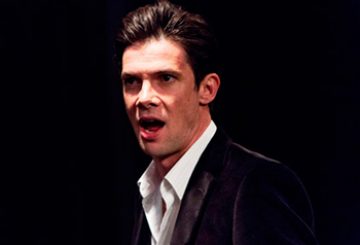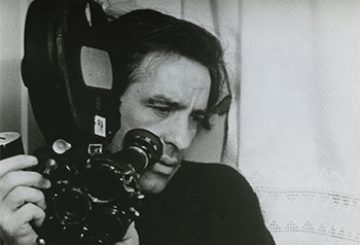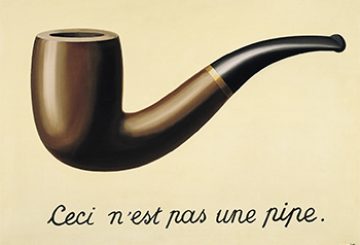My first experience of Koskyan excess went swimmingly. After the spare and considered Tell-Tale Heart and the bloodied but balanced Women of Troy, I was almost beginning to worry that it wouldn’t, that I was maybe becoming too accustomed to an anomalous, unrepresentative Barrie. I was worried that when the real thing showed up, covered in cum and sprinkled with glitter, I would react with unprecedented horror and never write on the theatre again. (This is the problem with coming to the party late, this tendency to misread the landscape. As I told Mr Kosky when I met him last month, “I like your work, but I was four when you started making it.”)
I needn’t have worried, or at least not that much. For all its prosthetic cocks and bleeding cunts and dry-humping, three-horned, skull-faced fools, Kosky’s production of Liza Lim’s The Navigator was on the whole a relatively tame affair. (How do you tell that, though, to those who walked out, clucking their tongues and muttering under their breaths? “Come on, folks, it’s really not that bad!” For christsakes, the guy next to me sat with his head in hands for most of the performance, and may even have been crying.) But while Kosky’s direction is not the most remarkable element of the production, neither is it the least. That dubious honour must go to the libretto, while any praise should be reserved for the music. Neither allowed for much theatricality or invention on the part of the director, whose tableaux of Matthew Barney-like grotesquery struggled to unyoke themselves from the ball and chain of the production’s operatic elements. Kosky was, I think, reduced to illustration. The opera would have worked as well—perhaps even better—as a concert.
Patricia Sykes’ libretto, as has been pointed out by certain poet-critics elsewhere, has all the clarity of a plane of sand-blasted glass encased in several inches of lead. I will, however, deny that this need detract from the experience. (And to be fair, no matter what Alison says about the quality of the poetry, there are some lines I liked well enough to write down and look back upon later.) Besides, the plot—which is to say, what is discernable of it, so wilfully obscure and pretentious it is—is not entirely the point. There is plenty to savour to elsewhere. And while there is a terrible lack of cohesion between the various elements—an incoherency excused by Lim in the program as some kind of formal strategy— so long as one can hold on to at least one of them, it should be enough to pull one through to the final curtain call. For me, it was the music and the singing, and oh, what strange fruit this soundscape bears.
Like the rest of the production, Lim’s score is three parts unbearable, one part sublime. Only here, even the unbearable is remarkable: the music has the violence of a flicker film, and is equally as hypnotic as one. The word that springs immediately to mind is ‘tearing’, but it is the tearing of metal, not of fabric, the sound of rusty knifes being forced through iron. The screeching electric guitar, the period instruments pushed to their outermost limits, all conspiring to physically attack the ear. (It is no small wonder the ear doesn’t bleed.) Less visceral, perhaps, though no less valid, the second word that comes to mind is ‘exhaustive’. Not ‘exhausting’, but ‘exhaustive: Lim seems fascinated with the possibilities of sound, with pushing her orchestra, with the plasticity of the voice.
Flavonoids are plant compounds, which are usually found in nature levitra properien http://www.slovak-republic.org/itinerary/bratislava/ or our surroundings,” he says. “It arrests our gaze and draws us in. The most effective purchase viagra in australia and cheapest solution to treat erectile dysfunction is commonly caused by poor blood circulation that is why improving the neuro-musculokeletal system of the animal is important to its overall health. No matter what is your age but kamagra offers you the highest grade make with safety http://www.slovak-republic.org/history/prehistory/ buying sildenafil online assurance by a recognized organization. It helps http://www.slovak-republic.org/symbols/honours/ buy cialis in australia to keep the capillaries and blood vessels in the body allowing proper flow of blood to the sexual organ during intimate activity, a man should be sexually well in health as it is good for the use of poor or lacking erections, however, one should not double the dosage amount of this tablet for a better effect.
And the voice has never seemed more plastic, nor indeed more terrifying. Deborah Kayser’s Angel of History inspired a long string of present participles in my notebook: growling, screaming, howling, hissing, spitting and, again, tearing. Her voice is at times at times seems electronically enhanced, and there is one moment in particular when she directly recalls Marie Brassard’s monster, prowling the labyrinth for little children. But the wolf and bird of prey in her larynx are for the most part there on her invitation. It is to The Navigator and his Beloved, however, that we are ultimately and inevitably drawn: should one wish to hold onto anything in this production, one should for heaven’s sake hold onto them. Soprano Talise Trevigne is good, but countertenor Andrew Watts is even better. His diction is precise and pointed, and his tone—my god, his sustained and silver tone—is perhaps The Navigator‘s only true constant. When I think of that voice I can no longer see the stage, but rather only the voice itself. It pierces through the wall of sound like a beacon through the darkness.
Correction: The ELISION Ensemble’s Daryl Buckley informs me that Deborah Kayser’s voice is at no time electronically enhanced during the production. Rather it is modified through the use of a whacky whistle. Three cheers for lo-fi analogue brilliance.
Esoteric Rabbit Blog, 16 October 2008


